Key takeaways:
- Podcasting fosters deep connections and community by allowing brands to share authentic stories that resonate emotionally with listeners.
- Effective podcasting requires quality equipment, content planning, and audience engagement to enhance listener experience and build trust.
- Consistency in publishing episodes is crucial for maintaining audience engagement and trust in the long run.
- Preparation and interaction with listeners are essential for creating meaningful content and fostering a thriving podcasting community.
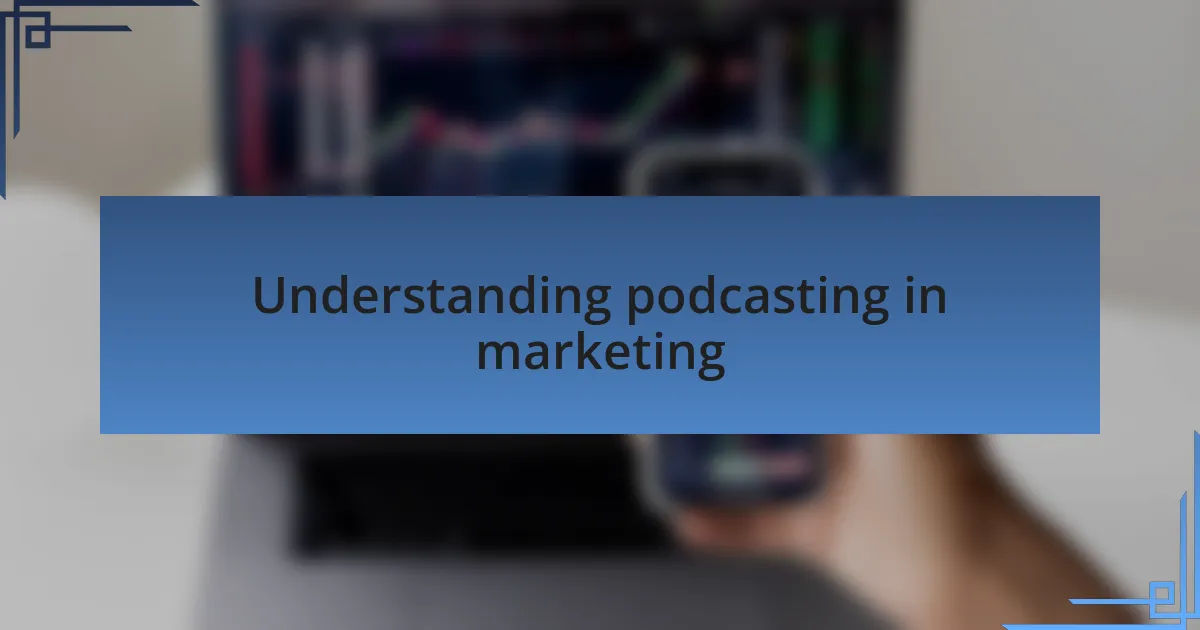
Understanding podcasting in marketing
Podcasting has become a powerhouse in the marketing landscape, and I’ve experienced its impact firsthand. When I first launched my own podcast, I didn’t realize the profound connections I would build with my audience. Each episode felt like a personal conversation, drawing listeners in and cultivating a loyal community around my brand.
One thing that struck me is how versatile podcasts can be for storytelling. They allow brands to share their unique journeys, challenges, and successes in a way that resonates on a deeper emotional level. Have you ever been captivated by a story told in a podcast? I know I have, and that’s what makes podcasting such an effective tool in marketing—it creates an intimate space for brands to connect authentically with their listeners.
Furthermore, I’ve noticed how podcasting can amplify other marketing efforts. For instance, featuring guests who have their own following opens doors to new audiences. It’s a beautiful cycle; you share insights, your guests share their stories, and you’re both enriched by the experience. Are you ready to leverage the storytelling power of podcasts in your marketing strategy? I wholeheartedly believe it can transform how you engage with your audience.
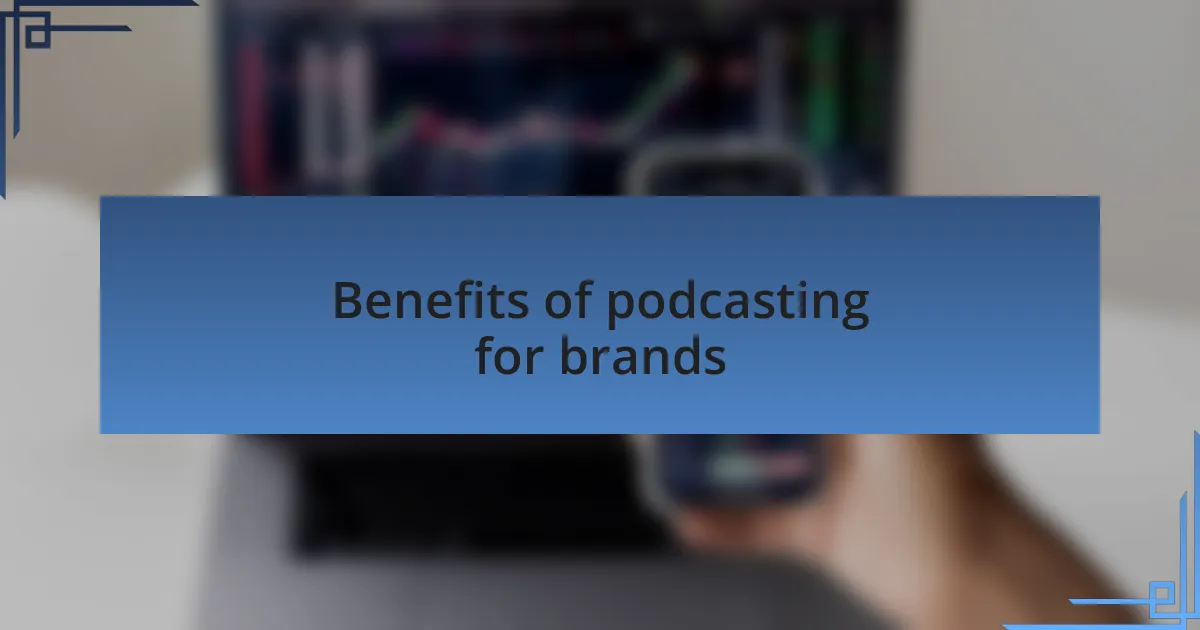
Benefits of podcasting for brands
Podcasting offers brands the unique ability to develop a personality that resonates with listeners. I remember the first time a listener reached out to tell me how an episode inspired them; it hit me then that my voice had the power to influence and motivate. Imagine being able to create a brand identity that feels relatable and trustworthy—this is what podcasting does beautifully.
Moreover, engaging with audiences through podcasts fosters a sense of community. I’ve had listeners comment on episodes, sharing how they relate to the stories or advice I provide. This dialogue creates a two-way street, where listeners feel valued and brands become more than just a name; they evolve into a part of the audience’s life. Isn’t it incredible to think that a simple audio format can forge such deep relationships?
Finally, consider the efficiency of podcasting as a marketing tool. Unlike traditional media, my experience shows that people often consume podcasts during their daily routines—think commuting or exercising. This creates an opportunity for brands to reach audiences when they’re most relaxed and open to new ideas. Doesn’t that sound like a win-win for both listeners and brands?
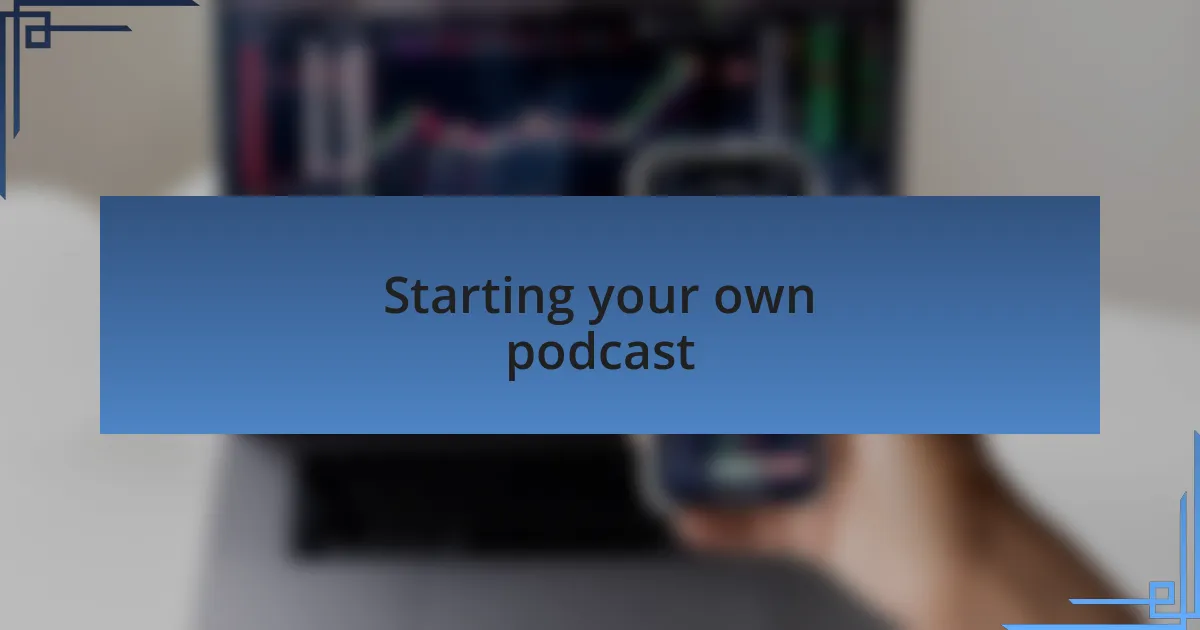
Starting your own podcast
Starting your own podcast may feel daunting, but it can be an incredibly rewarding journey. I can still recall the nervous excitement I felt when I hit that record button for the first time. Would anyone even listen? This initial fear is completely normal; however, my passion for sharing ideas soon outweighed my doubts as I discovered that my stories resonated with others.
Before diving into production, I recommend crafting a clear concept for your podcast. Establishing a defined theme helped me stay focused and allowed my audience to understand what to expect. For instance, when I centered my show on digital marketing trends, I noticed a more engaged listener base eager for insights. How could you refine your vision to carve out your niche in such a crowded space?
Once you have your content strategy in place, the technical side of things can be overwhelming, but it doesn’t have to be. I started with basic equipment and simple software, gradually investing more as my podcast grew. Learning as you go is part of the fun; don’t shy away from experimenting with different formats or styles. What equipment or styles have you been considering for your podcast? Embrace the process, and you’ll find your unique voice along the way.
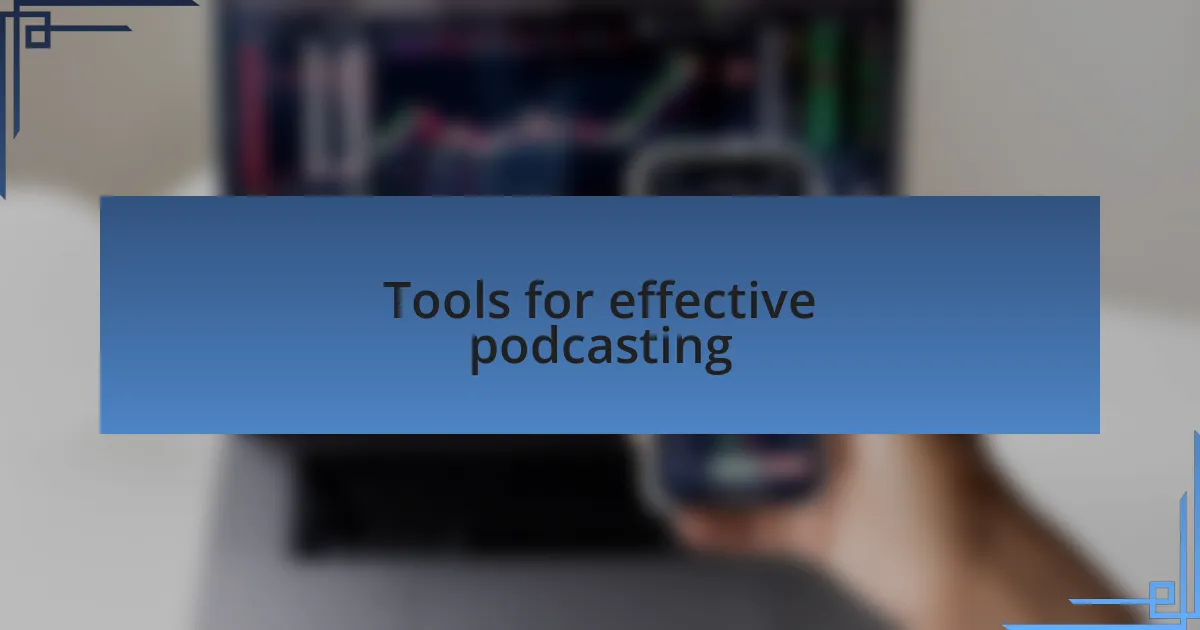
Tools for effective podcasting
When it comes to tools for effective podcasting, I can’t stress enough how essential quality recording equipment is. I started with a basic USB microphone, and while it served its purpose, upgrading to an XLR mic changed the game completely. The clarity and richness of sound really made a difference in how my podcast was received—it’s like night and day! Have you ever listened to a podcast with poor audio quality? It’s a real turn-off, right?
Editing software can also transform your podcasting experience. Initially, I relied on free tools, which were functional but limited in features. As I grew more comfortable, I transitioned to software like Adobe Audition, which offered more precision and capabilities. This investment not only improved the auditory experience but also made editing much more enjoyable for me. What editing tools have you considered, and how do they align with your vision?
Finally, don’t overlook the importance of hosting platforms. When I first launched my podcast, I chose a basic platform that was easy to use but lacked analytics. As I became more serious about growth, moving to a platform that provided detailed metrics allowed me to understand my audience better. It was enlightening to see what episodes resonated most. What metrics would be crucial for you to track as you monitor your podcast’s success?
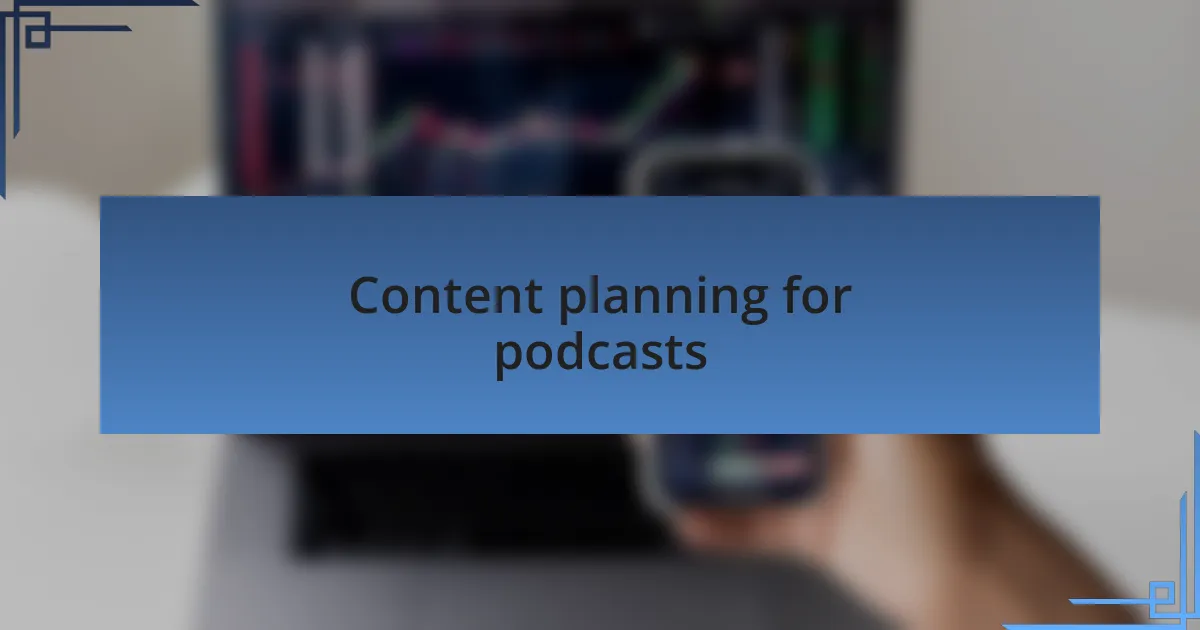
Content planning for podcasts
When I first started planning my podcast content, I realized that brainstorming topics well in advance was crucial. I keep a running list of ideas so that when it’s time to produce an episode, I have a treasure trove to draw from. This not only eases the burden of last-minute scrambling but also allows me to connect ideas over time—have you ever noticed how themes can evolve in a series?
Scheduling my episodes in a content calendar has also been a game-changer for me. I remember the initial chaos of inconsistent release dates, which led to a drop in listener engagement. By mapping out my episodes weeks in advance and integrating key dates—like holidays or industry events—I could align my content strategy with things my audience cares about. Have you considered how timing can impact your listeners’ connection with your content?
Finally, storytelling has become a core component of my content planning approach. I find that weaving personal anecdotes into my episodes not only makes the material more relatable but also allows me to build a deeper connection with my audience. Each episode becomes a journey, and I often ask myself: what story from my life can I share that will resonate with listeners? This practice has not only enriched my podcast but has also made the process far more enjoyable for me.

My personal podcasting journey
It was a leap of faith when I first hit “record.” I can vividly recall that initial rush of excitement mixed with sheer terror. Speaking into a microphone felt oddly intimate, like sharing my thoughts with an unseen friend. Did I really have something worthwhile to say? As I navigated through that self-doubt, I discovered that authenticity resonated most with my audience, transforming my anxiety into a fulfilling creative outlet.
Each episode became a chapter in my personal growth story. I remember sharing my struggles with work-life balance, hoping to connect with listeners who faced similar challenges. The feedback I received was overwhelming, with many expressing how my openness encouraged them to address their own issues. It made me realize how powerful vulnerability can be in building a community. Have you ever considered how sharing your own journey can inspire others?
Looking back, I now see my podcast as more than just a series of recordings—it’s a reflection of my thoughts and values. I have grown to appreciate the process of refining my voice and style. Early on, I recorded an episode that didn’t resonate with me, and it felt disingenuous. It taught me that authenticity over perfection not only fosters genuine connections but also leads to content that truly represents who I am. Isn’t it fascinating how our journeys shape our narratives in unexpected ways?
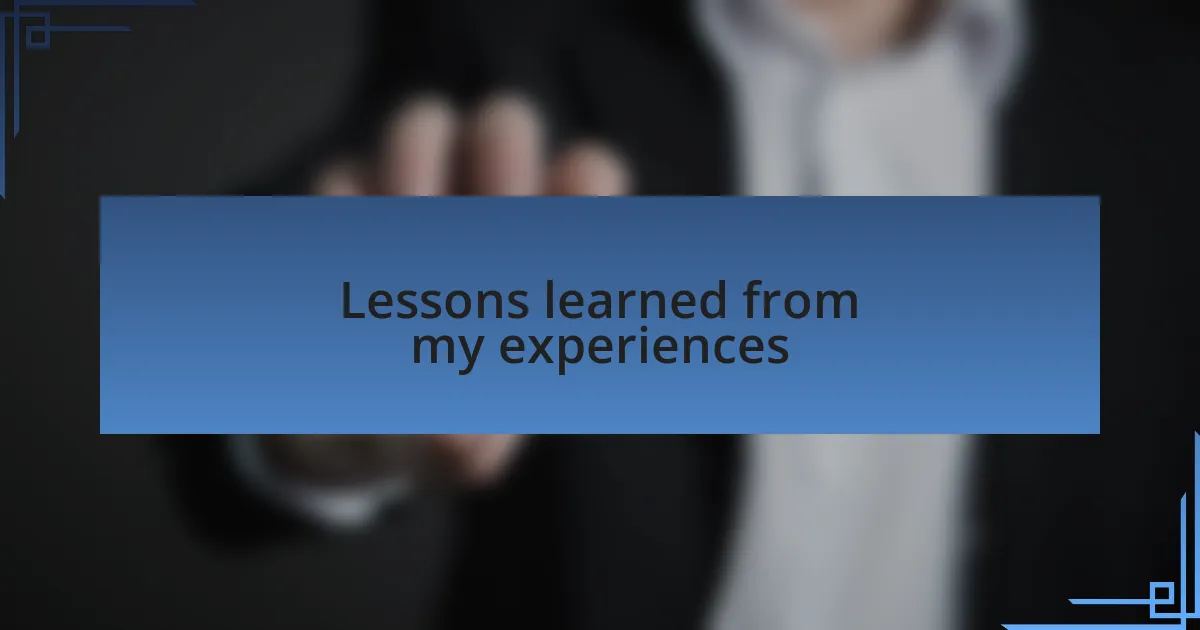
Lessons learned from my experiences
One critical lesson I learned was the importance of preparation. In the early days, I sometimes stepped into the recording booth underprepared, thinking spontaneity would carry the episode. I quickly discovered that without a clear outline or research, my thoughts often tangled into a confusing mess. Has there been a time in your life when lacking preparation led to unexpected challenges? That experience still lingers in my mind, reminding me that while authenticity is key, a solid foundation allows my true voice to shine.
I also realized how crucial it is to engage with my audience actively. Initially, I would publish episodes and wait for feedback, but I’ve since learned the value of interacting with listeners directly, whether through social media or listener surveys. I remember a particular instance when a listener reached out to share how an episode had significantly impacted their life choices. Their story reinforced my belief that fostering a dialogue can create a thriving community, transforming casual listeners into devoted supporters. Don’t you think building relationships is just as important as delivering quality content?
Perhaps the most poignant lesson was my understanding of consistency. I initially struggled with maintaining a regular upload schedule. After a few missed episodes, I noticed a dip in audience engagement. It struck me then that consistency not only builds trust but also establishes a rhythm that listeners come to anticipate. Reflecting on this, have you ever noticed how continuity can forge stronger connections? Each lesson, from preparation to audience engagement and consistency, has been a brick in the path toward growing not just as a podcaster but as a storyteller.